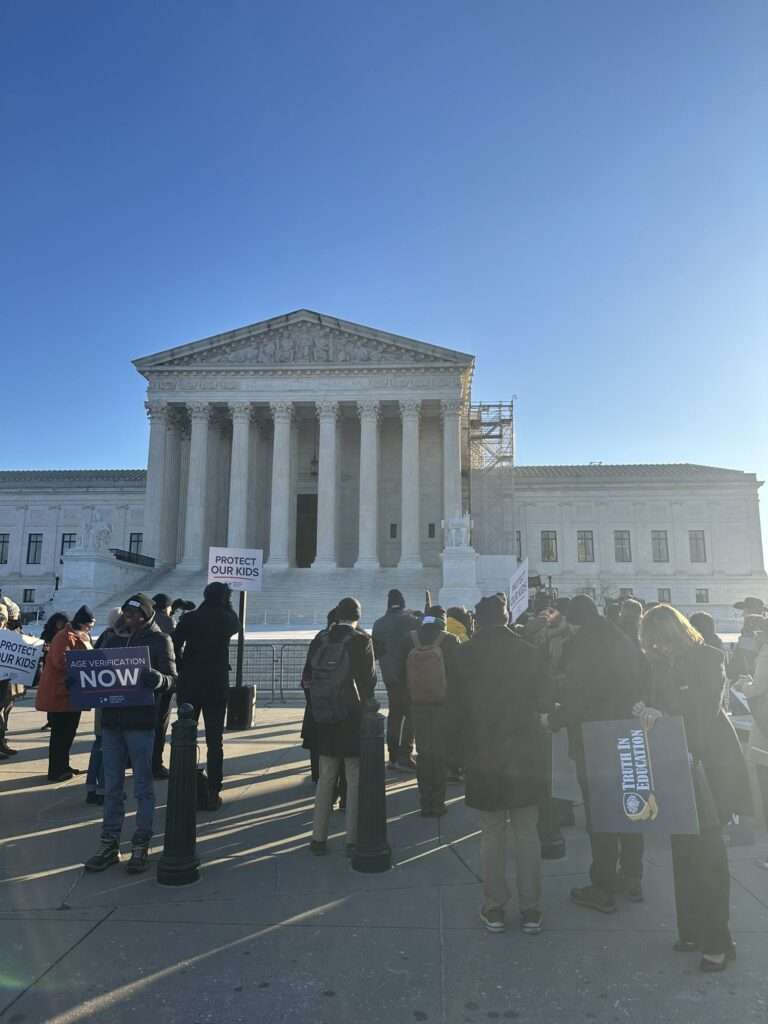A Texas law requiring people to provide proof of age before viewing online porn comes before the U.S. Supreme Court today. With similar laws already at play in 18 states besides Texas, and other states considering such measures, it's fair to say that the future of online porn in this country depends on what the justices decide in this case.
The Texas law (House Bill 1181) is being challenged by multiple plaintiffs, including the Free Speech Coalition (FSC)—an adult industry trade group that's being represented by the American Civil Liberties Union—and several adult content publishers.
H.B. 1181 "burdens constitutionally protected speech based on its content" and "violates this Court's consistent precedent," a lawyer for the FSC told the court in his opening argument this morning.
"Can age verification ever be constitutional?" Justice Clarence Thomas asked immediately.
"I don't think the Court needs to close the door to that here," but it would need to be narrowly tailored, said the FSC lawyer. He also suggested that content filtering software accessible to parents provided an alternative way to stop minors from seeing online porn.
Justice Samuel Alito seemed skeptical of the idea that content filtering was a workable option. "Do you know many parents that are more tech-savvy than their 15-year-old kids?" Alito scoffed.
If the problem is simply that parents aren't savvy enough to use content filtering software properly, or don't even know it exists, these are issues that could be resolved by educating and raising awareness among parents.
Yet educating parents wasn't even tried as an alternative, the FSC lawyer pointed out. The state went straight to requiring people to prove they're 18 or older every time they want to access sexually oriented content online.
Justice Amy Coney Barrett protested that content filtering isn't working, because minors can find porn through video game consoles and countless other digital routes these days.
But Barrett's comment inadvertently shows one of the flaws in proposals like the one in Texas, which only apply to online platforms where more than one-third of content is what Texas deems "sexual material harmful to minors." If kids can access porn from countless places online, including on social media platforms and through video games (neither of which would be subject to Texas H.B. 1181), how does requiring everyone who visits a porn website to show ID stop minors from viewing porn?

"Foreign websites are going to be completely undeterred and unchanged," the FSC lawyer pointed out. And then there are "search engines…social media." Minors can also use virtual private networks to mask their location if they live in a state where age verification is required. "The only way that kids are going to be protected from all those many sources" is through content filtering, he argued.
The FSC lawyer went on to suggest that the Texas law was not merely about preventing minors from viewing pornographic content but also about "a broader antiporn interest in preventing willing adults from accessing this content."
That gets to the crux of this issue. Age-verification laws infringe on the rights of adults to create and access constitutionally protected speech anonymously, under the guise of protecting children. Conservative proponents of such laws have admitted as much. For instance, one of the architects of Project 2025 (a conservative blueprint for the federal government under a second Trump administration) admitted that age-verification laws are a "back door" way to banning porn.
And it's working—Pornhub and its sister sites have begun blocking viewers in Texas and other states that have passed such laws.
But the issue goes beyond Pornhub and websites like it. Once you start establishing that the government can age-gate perfectly legal online content and burden adult privacy online in the name of protecting children, it's easy to extend this logic to all sorts of things that regulators think minors would be better off without, including access to social media, private web forums, chat apps, websites that provide information about sensitive subjects, and so on.
Soon, we're looking at the end of anonymity online entirely, in addition to all the other negative effects, like minors being prevented from accessing important outlets for information, connection, and support and everyone becoming more vulnerable to hackers and snoops. We're also looking at a lot more platforms being driven underground or offshore, where U.S. audiences can still access them but they're not necessarily beholden to U.S. oversight or law enforcement requests.
Oral arguments in Free Speech Coalition v. Paxton are still ongoing as I publish today's newsletter, so I can't say much about how the justices seemed to be leaning. But if they lean the wrong way on this, the repercussions will be huge.
More Sex & Tech News
A win for cryptocurrency: The U.S. Court of Appeals for the 3rd Circuit has rebuked the Securities and Exchange Commission (SEC) for its "arbitrary and capricious" denial of Coinbase's request that it clarify when digital assets are subject to federal securities laws. "Coinbase argued in its petition that the existing securities-law framework does not account for certain unique attributes of digital assets, which make compliance economically and even technically infeasible," the court noted in its ruling.
More from that ruling:
It also asserted that the SEC has exacerbated these difficulties by failing to articulate a clear and consistent position about when a digital asset is a security, and thus subject to the federal securities laws at all.
The SEC denied Coinbase's rulemaking petition. In a single paragraph, it explained that it disagreed with the petition's concerns; that it had higher-priority agenda items—namely, everything else it was doing; and that it may prefer to gather additional information through incremental action before engaging in more far-reaching rulemaking.
The court told the SEC to give a more complete explanation but stopped short of ordering the agency to promulgate rules.
Kathryn Haun, founder and CEO of the venture capital firm Haun Ventures, called the ruling "a massive victory for all of crypto" and noted that this was "the second federal court of appeals in a row to have unanimously rebuked the SEC for acting in an 'arbitrary and capricious' way in this industry. The courts have been clear: you can't give out speeding tickets without first sharing the speed limit."
TikTok updates: Rumors are circulating about Elon Musk potentially buying TikTok from its parent company ByteDance, which has been ordered by the U.S. government to sell off its U.S. subsidiary. If it fails to do this, and the Supreme Court fails to intervene, TikTok will be banned as of January 19. Hilariously, a new Chinese social media app—Xiaohongshu (RedNote)—is rising to No. 1 on the App Store, suggesting the government is in for an ongoing game of Whac-A-Mole in its misguided crusade to stop Chinese "influence" infiltrating our app stores and smartphones.
Greene goes rad-fem: Rep. Marjorie Taylor Greene (R–Ga.) is trotting out the old—and still wrong—"porn is not free speech" line in a call for X to remove pornographic content. Green also mixes some old-school radical-feminist ranting into her moral majority claims, saying that women who make porn are "destroying the value of women" and that calling it free speech is a lie that "devours so many people's souls."
Artificial incrimination: AI-enabled facial recognition is shaping up to be the new bad "science" undergirding police interrogations. It's proving every bit as vulnerable to abuse and conducive to wrongful convictions as things like "bite mark science" and blood spatter analysis were in the past. The Washington Post takes a deep dive into this unfolding tragedy, noting that"at least eight Americans have been wrongfully arrested."
More on the Massachusetts sex-trafficking case: This week's COYOTE RI podcast delves into a case covered in this newsletter on Monday, involving Massachusetts men charged with sex trafficking for agreeing to pay for sex with undercover cops posing as sex workers.
Today's Image

The post The Future of Online Porn Is At Stake Today appeared first on Reason.com.







